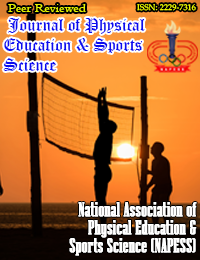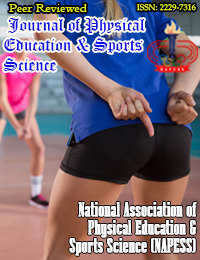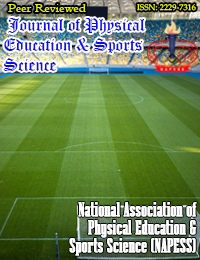MANAGEMENT OF PROFESSIONALIZATION OF MODERN OLYMPIC SPORT IN THE CONTEXT OF ADVANCED EXPERIENCE IN ORGANIZATION PROFESSIONAL SPORT
Download PDF
Purpose of the study: substantiate the possibility of using the experience of professional sports for the development of Olympic sports in the conditions of commercialization and professionalization.
MANAGEMENT OF PROFESSIONALIZATION OF MODERN OLYMPIC SPORT IN THE CONTEXT OF ADVANCED EXPERIENCE IN ORGANIZATION PROFESSIONAL SPORT
Olha Borysova
National University of Ukraine of Physical Education and Sport, UKRAINE
Corresponding Author: Olha Borysova, borisova-nupesu@ukr.net
Abstract. Purpose of the study: substantiate the possibility of using the experience of professional sports for the development of Olympic sports in the conditions of commercialization and professionalization.
Research methods included: analysis, synthesis and generalization; comparison, comparison and analogy; abstraction, induction, deduction; modeling; analysis of scientific and methodological literature and documentary sources; historical-logical, concrete-historical, comparative-historical; system approach and structural-functional analysis; surveys and observations; methods of mathematical statistics.
Results: Possibility of use of experience of professional sports for development of Olympic kinds of sports in conditions of commercialization and professionalization is proved; the history-theoretical analyzes of development of professional tennis in the world is carried out; and also the complex analyzes of professional tennis as social phenomenon, its organizational-legal and economic forms, management structures at the international and national levels is carried out, features of a labor market and regulation of labor relations are allocated. Application of the dialectic approach has allowed not only to analyze and generalize from uniform positions available in the literature and world experience of a basis of functioning and a direction of development of sports, but also to find the general logic of such widely discussed questions in the modern literature, as formation and perfection of national systems of sports, problems of preparation of sportsmen of a high class etc.
Conclusion: The received knowledge concerning tennis, experience of its development in sports movement can be applied in other kinds of Olympic sports. Given the high cost of training high-class athletes, the state’s interest in raising the level of the national championship, forming relationships with athletes of national teams, which allow them to control their preparation for the main starts - world championships, the Olympic Games, it is advisable to use this mechanism to reorganize and improve the country's sports system, forecasting its trends and development prospects, taking into account already committed and corrected errors. The combination of intellectual resources not only in space (leading experts in the world in various fields: law, economics, organization, sports, etc.), but also in time (historical aspect) can contribute to the construction of an effective generalized concept for the development of sports, its transformation or management them.
Keywords: system of the organization and management of sports, sports competition, commercialization and professionalization of sport, professional tennis, business, marketing, model
Introduction. Prompt growth of popularity of sports on international scene, increase of the political importance of performances of sportsmen as factor of national prestige, professionalization and commercialization Olympic sports cause necessity of optimization of a management system of sports in the country. It is characteristic, that an orientation to the maximum social and economic efficiency, an esthetics and staginess today are not less important components of sports, than sports result. Change of relative density of a professional component in the general system of sports predetermines necessity of special attention to all kinds of maintenance of sports preparation: organizational-administrative, economic, legal, personnel, material, scientifically-methodical, medical, etc. (Platonov V., Bubka S., Bulatova M., 2009; Imas Y., Borysova O., 2017).
One of the basic tendencies of development of a modern society is globalization owing to which defining features of functioning of modern sports are: integration into market economy system, migration of sportsmen and coaches, formation of the powerful transnational market of the sports equipment, information and ideological measurements.
The radical changes occurring in modern sports of the higher achievements, cause necessity of working out of its strategy of development at national level according to universal tendencies. In a special measure it concerns the Post-Soviet countries having enormous historical and practical experience of construction of an effective management system and preparation of sportsmen in Olympic sports, but practically absent - in professional sports.
Thereof, today there was a sharp necessity for the analysis of tendencies of development of professional sports, and also possibility of use of the American and West European experience for the purpose of development of national systems. The special attention by methodology of professionalization Olympic kinds and development of kinds of sports which traditionally have the status professional, is involved with long-term history of development of tennis as professional kind of sports.
Material & methods. The methodological basis of the study was a dialectical approach based on awareness of the universality of the relationships of social processes and phenomena, an adequate reflection of reality. The research methodology is also based on the knowledge and experience gained in the field of Olympic and professional sports, which are presented in the works of domestic and foreign experts.
Research methods included: analysis, synthesis and generalization; comparison, comparison and analogy; abstraction, induction, deduction; modeling; analysis of scientific and methodological literature and documentary sources; historical-logical, concrete-historical, comparative-historical; system approach and structural-functional analysis; surveys and observations; methods of mathematical statistics (Kostyukevich V.M., Voronova V.I., Shynkaruk O.A., Borysova O. V., 2016).
Results and Discussion.
Modern tennis was presented in the program of the 1st Olympic Games in 1896. Later, the professionalization of tennis and the contradictions associated with it regarding the policies of the International Olympic Committee (IOC) led to the exclusion of this sport from the Olympic program in 1926. For 62 years, tennis developed exclusively as a professional sport and was returned to the program of the Olympics only in 1988 after liberalization of the IOC policy regarding the professionalization and commercialization of Olympic sports.
Tennis entered in Olympic program with its own rules and traditions, a universal structure and the decisive role of the economic component, advanced management, with balanced rights and obligations of players and organizational and management structures based on the principles of democracy. At the same time, tennis throughout the entire modern history relied on the philosophy of Olympism, the fundamental principles of the Olympic movement (Borysova O. V., 2011).
As the model of development of sports in the country can explain universality of tennis from following positions (fig. 1).
Significantly important is the significant duration of the development stages (over 20 years), which allows us to determine the differences in the state of the object at the beginning and at the end of the review, which have sufficient expressiveness.
The absence of tennis in the Olympic program for more than 60 years has contributed to its effective development in accordance with the requirements of the time, and not just the Olympic Charter, and what is extremely important is the creation of an organizational and management system, the main feature of which is compromise (Fig. 2): the presence of various governing organizations The Association of Professional Tennis Players (ATP), the Women's Tennis Association (WTA) and the International Tennis Federation (ITF), the democratization of the sport, determined by the role of athletes, their independence from national federations and the solution of many legal issues.
Globalization in sports is an objective consequence of an aggravation of insoluble problems at the state level and contradictions, develops irrespective of activity of national social institutes and is caused by the external reasons for them. Tennis globalization provides both natural association and a corporate reconstruction (fig. 2) (Amis J., T. B. Cornwell, 2005).
Today, tennis presents almost all aspects of the globalization of sports institutions: management structures (international federation and professional associations), personal and team competitions, as well as athletes themselves. Corporatization through the use of tools and methods of management and marketing of sports contributes to the formation of tennis as a spectacle and market for goods, which is based on the universal differentiation of labor. Such a system of organization and management based on transnationalism (communication, interaction, media) and cosmopolitanism allows us to solve the problems of natural selection in sports and the individual implementation of athletes, regardless of nationality and level of development of sports in the country.
The analyzes of dynamics of development of tennis, since the Ancient world and finishing the present which allows to assert, that a major factor of development of a kind of sports was interest of the upper class (kings, the nobility, presidents), and features of functioning at various historical stages - a kind elitism, absence sports orientations (entertainment) and professionalization, providing both criterion of a social accessory, and reception of material compensation (fig.3).
In history of development of modern tennis 5 periods are allocated: 1875-1895; 1896-1925; 1926-1967; 1968-1987; 1988 - on the present time, caused by basic influence of set sociopolitical, business factors and factors of development of sports movement. Origin of tennis in the conditions of formation of free market relations, its exception of the program of the Olympic Games for the long period (from 1928 to 1988), an era of “open tennis” (since 1968). Fast rates of development and popularization of a professional direction in the world have defined professionalization and commercialization an amateur direction and, as consequence, creation of uniform international system of competitions. The essential factor which has affected development of modern tennis, returning to it of the status of an Olympic kind of sports, the admission of professionals to participation in Olympic games that promoted not only to progress of professional tennis practically in all member countries of the international Olympic movement (207 national federations), has affected features of a sports labor market and regulation in it of labor relations, but also became a source of the best practices for professionalization other kinds, search of perspective ways of an exit from the contradictions which have developed between Olympic and professional sports.
The analyzes of dynamics of development of tennis, since the Ancient world and finishing the present which allows to assert, that a major factor of development of a kind of sports was interest of the upper class (kings, the nobility, presidents), and features of functioning at various historical stages - a kind elitism, absence sports orientations (entertainment) and professionalization, providing both criterion of a social accessory, and reception of material compensation.
Today in tennis development take part more than 200 countries of the world, each of which differs a public and political system, national signs, legal and organizational systems. For increase of efficiency of organizational-legal regulation we will allocate object and a subject. As object tennis on global (international) and national (the separate countries-participants) levels acts. As a subject activity and behavior of people - subjects of the market (heads, functionaries, sportsmen, coaches etc.), and also relations between the international and national, public and state organizations of a various orientation (sports, commercial, scientific, medical etc.) the world countries (fig. 4).
Today, the prevalence of international law over national legislative norms is noted, which often leads to contradictions in the legislative framework. International law is advisory in nature, but the governing national sports organizations, federations, clubs in their activities are guided by the generally accepted rules and charters in the world, legislative acts. An example of such provisions and acts in sports are: the IOC Olympic Charter, the Anti-Doping Code of the Olympic Movement, the charter of the International Sports Federation (ISF), the rules and regulations of competitions, etc.
The main organizations that determine the legal framework for the functioning of tennis at the international level are the structures of the Olympic sports field: ITF, IOC and the Court of Arbitration for Sport (CAS), and professional organizations: ATP, WTA, American Arbitration Association (AAA).
Development of world professional tennis occurs according to the laws inherent in difficult systems. The commercial organizations form the markets of the finance and work, manufacture and sale of sports-entertainment services and the consumer goods, the mechanism of free prices, etc. Accessory of system of professional tennis to business sphere causes atmosphere of a rigid competition in all its structural formations, dictated by the market, that, on the one hand, makes active processes of monopolization in the system, with another - provides its further development. Thus in a prize there are practically all subjects of market relations: tennis players, their agents, coaches, organizers of tournaments, firms-sponsors, spectators (sellers and buyers of sports-entertainment services), etc. (fig. 5).
The modern system of the organization of professional tennis in the world represents transnational association with global level of the management, which activity is directed on transformation of a kind of sports to the profitable commercial enterprise with culture of "super states" dominating in it (mainly to the USA), where the result of work (a product - a show) is sale more than in 200 countries. Tennis globalization in economic, organizational, legal, technological, information, scientifically-technological, social, political and other displays has caused formation of structure of the world tennis bourgeoisie united corporate (first of all economic) interests. It is necessary to carry to them: firms-manufacturers of the goods, services and entertainments (including mass-media); the international sports organizations; leading tennis players-professionals (fig. 6).
Feature of modern tennis, and in particular systems of competitions, is not only stability of a calendar (carrying out terms), but also attachment to sports objects (a carrying out place). Today tennis tournament is the independent and economic action assuming not only direct carrying out of competitions, but also the decision of some organizational questions, questions on the property rights, attraction of financial assets, participation of players etc. As a bright example for that four tournaments of "Grand Slam".
Stability of organizational-administrative system of tennis, absence of the crisis phenomena, characteristic for other kinds of sports (mutual relation of players and organizers, economic), is predetermined by activity of three administrative organizations - ATP, WTA, ITF, the competitions forming uniform system, providing balance between financial indicators, achievements in sport and a corresponding place in Olympic movement, and also independence of sportsmen as subjects of the market from national structures (state and public), including at definition of priorities of the career.
The basic features of functioning of national structures of the professional tennis defining efficiency and equation of their activity, are: various schemes of formation of an infrastructure of sports, level of achievements in sport of leaders and national teams, quality of the organization of internal and international competitions, conditions for preparation of sportsmen and work of coaches, and also the home market and change condition, occurring in a society (social, economic, political, etc.). The general for all subjects is dependence of development of national organizational-administrative structure on the tendencies in world system of professional tennis.
The factors having the high importance and defining an organizational condition of professional tennis for the countries in transitive conditions as for Ukraine are (fig 7.): bases of system of the sports, put in pawn during the Soviet period; social and economic possibilities; rates of their adaptation to market conditions; national traditions.
At the same time active participation political and statesmen, heads of local administrations, prominent representatives of business circles, a science and culture, mass media in tennis development, and also use of the advanced sports practice of the strongest western professional commands, positive organizational experience of the centralized complex preparation of national teams of the USSR (base, a technique, coaches, medicine) and modern mechanisms of sports management has allowed Russians to occupy in the lead position in youthful sports and is essential to strengthen positions in professional tennis.
Conclusions. The received knowledge concerning tennis, experience of its development in sports movement can be applied in other kinds of Olympic sports. Given the high cost of training high-class athletes, the state’s interest in raising the level of the national championship, forming relationships with athletes of national teams, which allow them to control their preparation for the main starts - world championships, the Olympic Games, it is advisable to use this mechanism to reorganize and improve the country's sports system, forecasting its trends and development prospects, taking into account already committed and corrected errors. The combination of intellectual resources not only in space (leading experts in the world in various fields: law, economics, organization, sports, etc.), but also in time (historical aspect) can contribute to the construction of an effective generalized concept for the development of sports, its transformation or management them.
Conflict of interest: Authors state no conflict of interest.
References:
About the Womens Circuit (2020): http://www.itftennis.com.
Amis J., T. B. Cornwell (2005) Global sport sponsorship– Oxford: Berg, 2005. – P. 78–131.
ATP Partnership (2020): www.atpworldtour.com/ News/Tennis
Borysova О. V. (2011) Modern professional sports and ways of its development in Ukraine (tennis [text]:monograph. Kiev: Center of Educational Literature. 312 p.
Imas Y., Borysova O., Shlonska O., Kogut I., Marynych V., Kostiukevych V. (2017). Techical and tacticaltraining of gualified Volleyball players by improving attacking actions of players in different roles //Journal of Physical Education and Sport (Jpes), Art 66. P. 441-446.
Imas Y., Borysova O. (2017). Professional tennis: problems and development prospects. Olympic literature, 288.
Kostyukevich V.M., Voronova V.I., Shynkaruk O.A., Borysova O. V. (2016). Basics of research work of undergraduate and graduate students at the institutes. LLC «Nilan-Ltd» 554 p.
Platonov V.N. (2015) System of training athletes in the Olympic sport. General theory and its practical applications: in 2 books. Kiev: Olympic literature. Book 2.752 p.
Platonov V., Bubka S., Bulatova M. (2009). Olympic sport: 2 volumes; under gen. ed. of V. Platonov. - K.: Olympic Literature, 684 p.
Information of the authors
Olha Borysova
Professor, Doctor of Science
Vice-Rector on scientific and pedagogical mattersin of the National University of Ukraine on Physical Education and Sport, UKRAINE, 03150, 1, Fizculturyst., Kyiv, Ukraine
+380676585028
borisova-nupesu@ukr.net

















